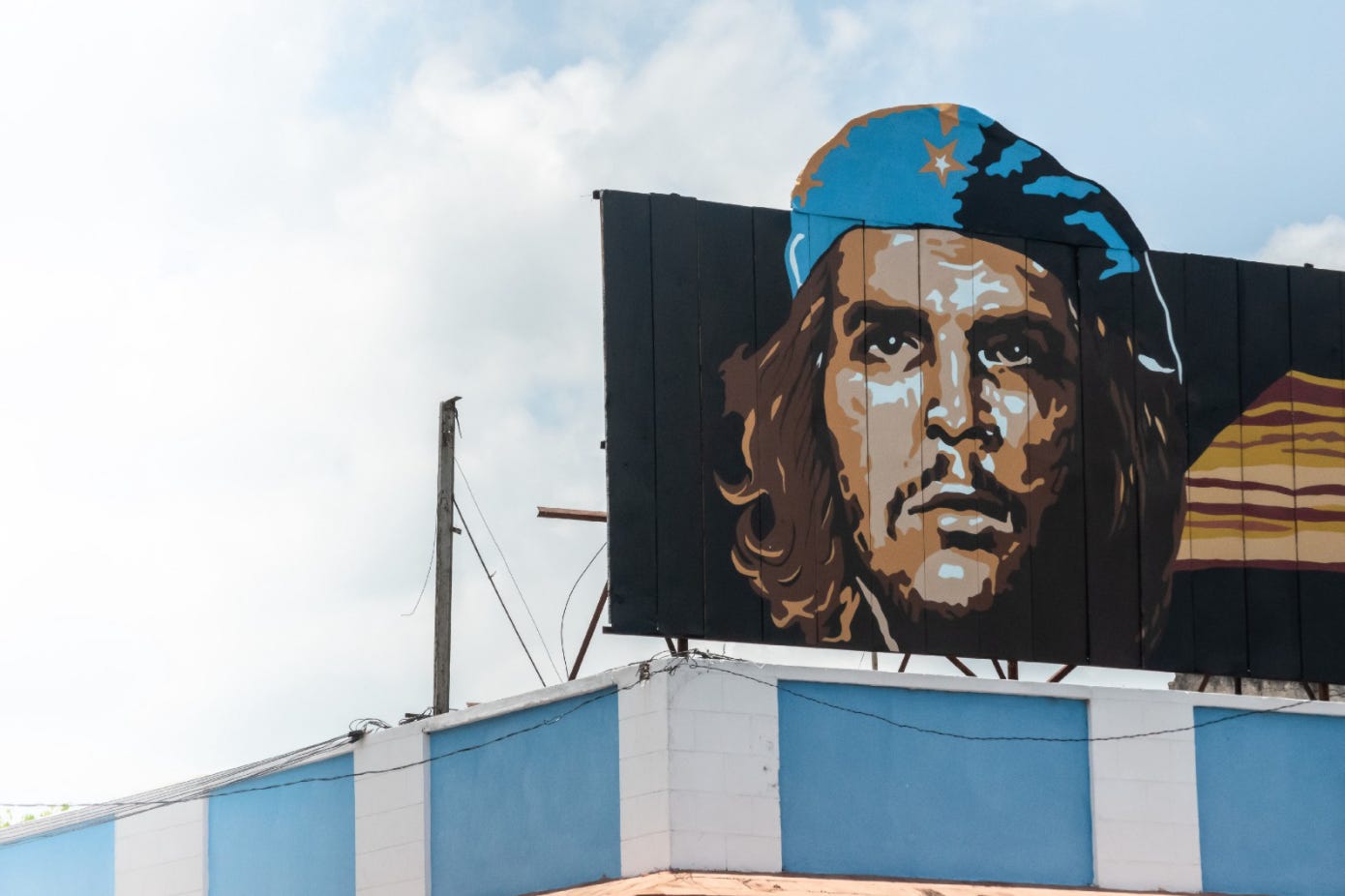Friday Fun Flier X
Before we begin, I have awesome news! This week, I was a guest on Speakeasy Magazine’s podcast! I’ve published a few pieces with these guys in the last few months. The founder Ari Blaff and I have had some great conversations, and we decided to mike ourselves up and record! If you’d like to hear the voice of the person who’s been writing to you these past few months and learn who I am and what I stand for, this conversation is for you.
Here are the links:
I hope you have as much fun listening as I did recording :)
Quote of the week:
“I was telling you that to be a revolutionary requires having a revolution. We already have it. And a revolutionary must also know the people with whom he or she is to work. I think we still don't know each other well. I think we still have to travel a while along that road. Yet if we know the goals, if we know the enemy, and if we know the direction in which we have to travel, then the only thing left for us is to know the daily stretch of the road and to take it.”
-Che Guevara
In December of 1951, Ernesto “Che” Guevara and his med school friend Alberto Granado set out on a motorcycle trip that would take them from Argentina to Venezuela over the next eight months. They'd go through five countries, sleeping on floors, hitchhiking (after they finally had to sell their motorcycle La Poderosa II for scrap in Chile), and living/working with the people they met along the way.
They'd visit Machu Picchu, where Che would learn that American archaeologists had packed up Incan artifacts and shipped them back to the US. They'd visit the American-owned copper mines in Chile, where people labored in the most unsafe working conditions they'd ever seen.
It was this trip that would turn Che from middle-class med student to revolutionary. He'd go on to fight in the Cuban Revolution with Fidel Castro, to train rebels in the Congo, and be murdered by the CIA while fighting imperialism in Bolivia. There's a lot of debate about what his last words were, but the story that seems most true to form (and that I like the most) is that upon being captured, he told the sergeant ordered to kill him: “I know you are here to kill me. Shoot, coward, you will only kill a man.”
Last week, I went out for lunch with my soccer coaching counterpart and her partner. Their meet-cute story is spectacular. They met while hiking the PCT.
Shortly after they met, as they were walking together, my counterpart fell and smashed her knee into a rock so hard that she partially tore her ACL. Her partner (who was just her friend at that point) walked her out of the woods, step-by-step, for four days.
Trail culture took care of them. As they walked, people passing them on the trail gave them food. Tons of food. More food than they could eat or carry, to the point that they had to give some away to people who came after them. Some people even backtracked on the trail to see if they were okay.
As I listened to their story, I couldn't help thinking of my own experiences as an international backpacker. “Trail culture” is so much like what I've experienced as a traveler. People who don't have food to share have shared food with me. People have opened their homes, gone out of their way for miles to help me find something I was looking for, and even invited me to weddings!
People who have stepped out of society, even for small amounts of time, understand what's important in ways that those who never leave the rat race can’t. If people are given an honest chance to be good (outside of a society that pits them against one another and tells them that there’s a scarcity of resources) then they are generally good.
Western culture’s definition of “success” is backwards. We believe that the ones who are most deserving of our adoration are the ones who have alienated themselves from others, spending tremendous amounts of time alone until they've become “self-made.”
We want to be like these people. We read articles about their morning routines. We listen to podcast interviews where they tell us what they eat. I don't care what Jeff Bezos eats! I don't want to be like a man who blasted a spaceship to the outer frontiers of human greed. I don't want to follow the legacy of going through the world's most expensive divorce.
Self-made is not success. Success is measured by the depth of your relationships and the time you spend with the people you love.
That's what Che Guevara learned on his motorcycle trip. It's what my counterpart and her partner learned on the PCT. It's what Cheryl Strayed and Thoreau learned in the woods. It's what you have to get out of society (if only for a few days) to understand.
We are only pessimistic about human nature because Western Society matches us against each other and tells us that there are limited resources and that we have to win! (And that everyone who doesn’t win is “lazy”).
Most people who have thru-hiked or traveled and stayed in a “less fortunate” culture have seen the truth: human beings are good when given a chance to be good.
It's hard to see this when we're living in our modern dystopia of surplus, where people in wheeled metal boxes scream at each other for minor inconveniences. We are taught from a young age (we read Lord of the Flies in school) that if left alone, human beings will become beasts, slaughtering each other in chaotic anarchy. Therefore, we need people in power to tell us what to do!
Spend a few days out in nature with people or out on the road, and you'll quickly realize that this isn't true. Hell, look at the explosion of altruism that comes after almost any disaster! (**Disclaimer** Joel Osteen, owner of the most punchable face in America, is exempt from this statement).
We are the answer. Power is the lie.
What’s worth reading:
Che Guevara: A Revolutionary Life by Jon Lee Anderson
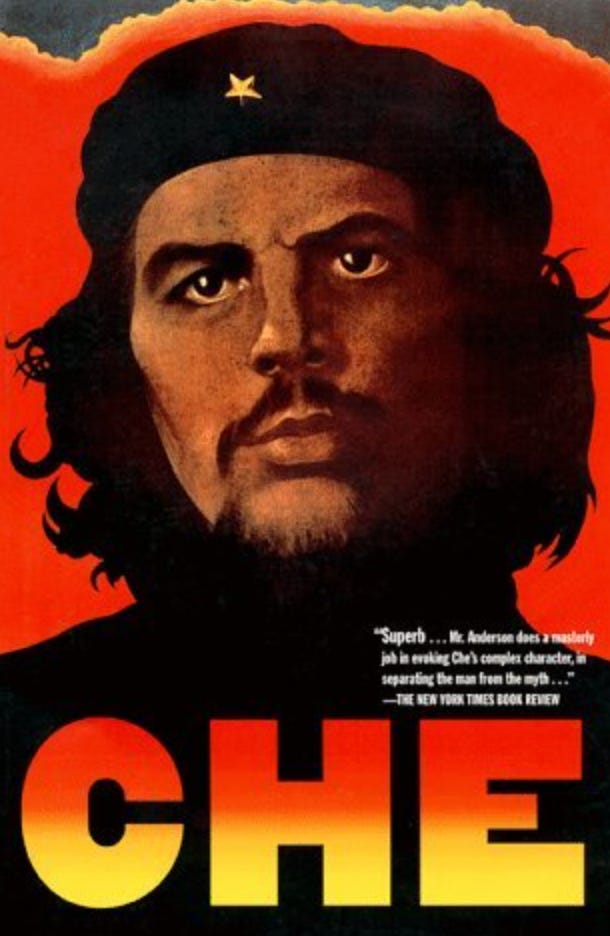
Everything I read and watched this week has to do with Che Guevara because it's my spring break and I wanted to take a deep dive into the life of this complicated, wildly interesting man. Now, I don't want to give the impression that I think he was a saint. He was not.
What fascinates me about Che is that he walked the walk more than any historical figure I've ever read about. He fought in three revolutions that had nothing to do with his own country (he was Argentinian) because he believed in a United South America, free from banana republics and us-backed dictators (unfortunately, the CIA had other plans... Spoilers).
He lived simply and labored alongside the people when the Cuban Revolution was completed. His hatred of money was so powerful that when Fidel Castro appointed him Secretary of the Treasury after the Cuban Revolution, he signed all of the banknotes as “Che” (the equivalent of “dude” or “hey you”).
This fascinating biography covers his entire life (which is why I'm only halfway through its 750+ pages). The half that I've read so far, spanning Che’s childhood through the Cuban Revolution, paints a picture of an adventurous kid who grew up questioning, reading a ton, and developing a sense of fairness and revolutionary ideals from his time as a traveler. He then stuck by those ideals until he ended up dying for them. This book shows you the breadth of his fantastically full life and is worth a read as a one-stop-shop for Guevara fans.
The Motorcycle Diaries by Che Guevara
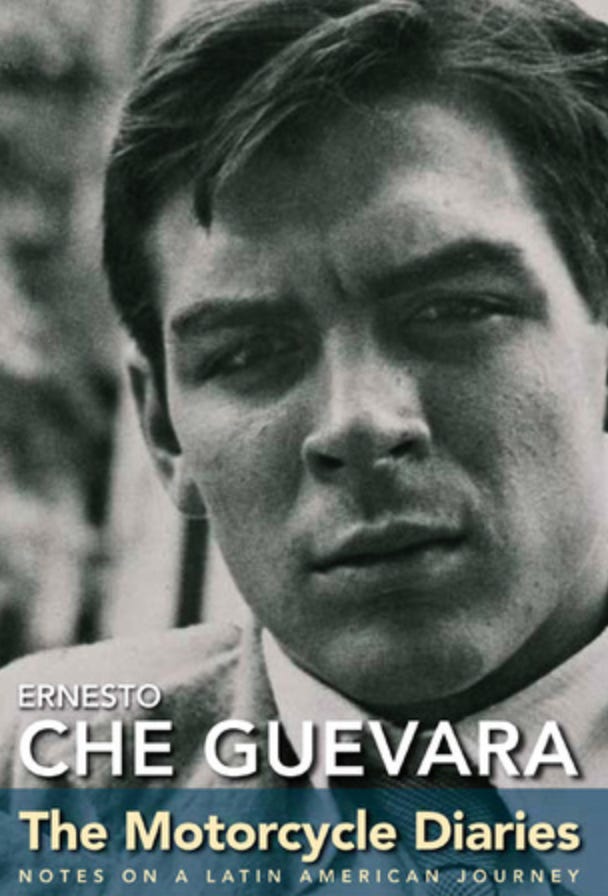
This book is a collection of Che’s private writings from his motorcycle trip with Alberto. Through it, we can feel Che wrestling with his identity as a middle-class med student, seeing how his comfort was built on the backs of a suppressed population of people thought of as “low-class.” It was on that motorcycle trip that Che discovered his love for the people and decided to fight for them, to end imperialism in South America. There's a beautiful bit at the end called quote notes in the margin, where Che writes out the needs of a revolution. I'll quote some of it here:
“The future belongs to the people, and gradually, or in one strike, they will take power, here and in every country. The terrible thing is the people need to be educated, and this they cannot do before taking power, only after. They can only learn at the cost of their own mistakes, which will be very serious and will cost many innocent lives. Or perhaps not, maybe those lives will not have been innocent because they will have committed the huge sin against nature; meaning, a lack of ability to adapt.”
This book is the only bit of travel writing I've ever read by one of the world's most influential revolutionaries. For that reason alone, it's worth the read.
What’s worth watching:
The Motorcycle Diaries
I told you, this week was a deep dive into Che Guevara's life for me! This is a film version of Che’s now-infamous motorcycle trip, directed by Walter Salles and produced by Robert Redford. It's gorgeous. The locations they filmed in our beautiful, and the actor who plays Che captures his essence beautifully (fair warning, the entire film is in Spanish)
A great podcast I listened to this week:
Chaos by Throughline
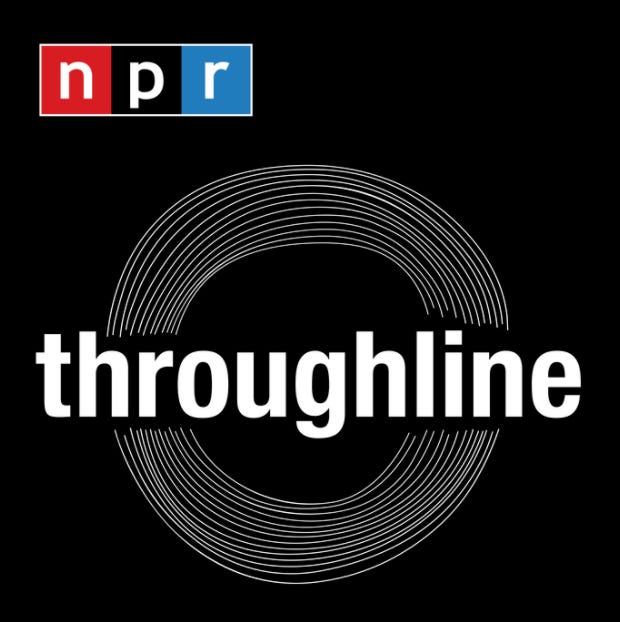
Throughline was introduced to me last week by a new friend, and it's been holding me over while I wait for season 6 of Revisionist History (come on Malcolm Gladwell, pull it together). This podcast looks at historical events, using them to explain the events of today's world. This episode, Chaos, is about how we got the belief that human beings are, on a base level, chaotic and uncooperative. Have you ever wondered why we read Lord of the Flies in school? Ever wanted to know what really happens when kids are Shipwrecked? Your answers await in this episode!
And finally, the feel-good story of the week!
I needed this one this week. On Monday, March 22nd (my 28th birthday) there was a shooting that took ten lives in Boulder, Colorado. As I was looking for something to cheer me up in the midst of the chaos, I found this story, that also ran on my birthday:
Darius Brown, a teenager from the DC area, has taken it upon himself to sew bow ties for shelter dogs to make it more likely that they’ll get adopted. Here he is:
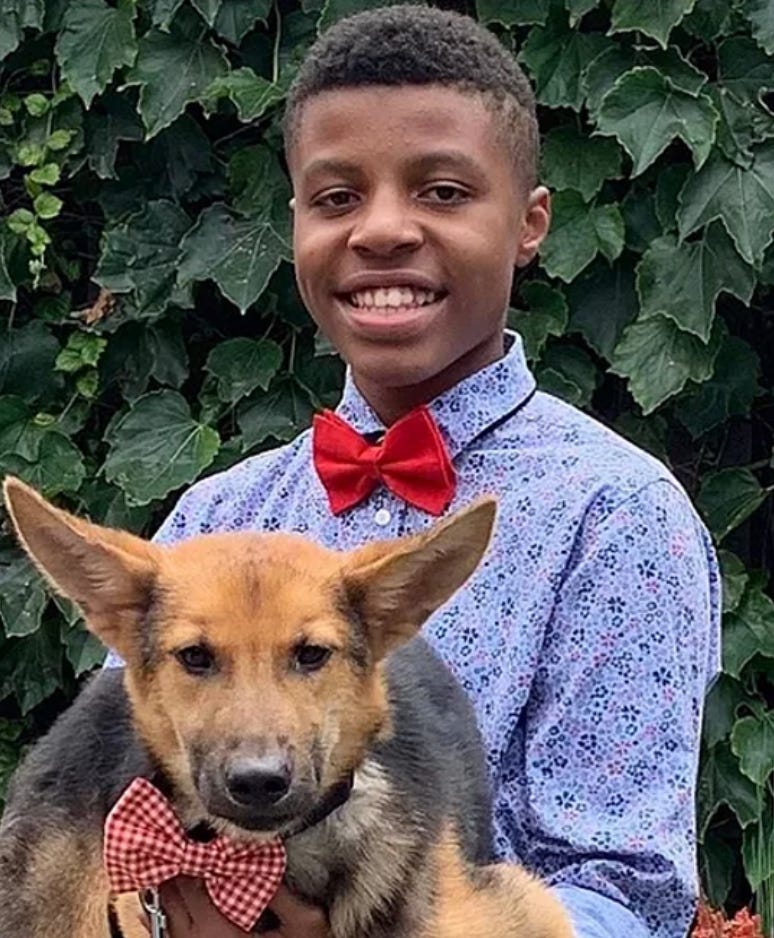
The full story is available here.
That’s all for this week folks! As always, you can reply directly to this email to interact with me. If you enjoyed what you read, you can hit ‘like’ on this email, or leave a comment. If you really liked what you read, please hit ‘share’ and tell a few friends!
Thank you for reading,
Aaron.




